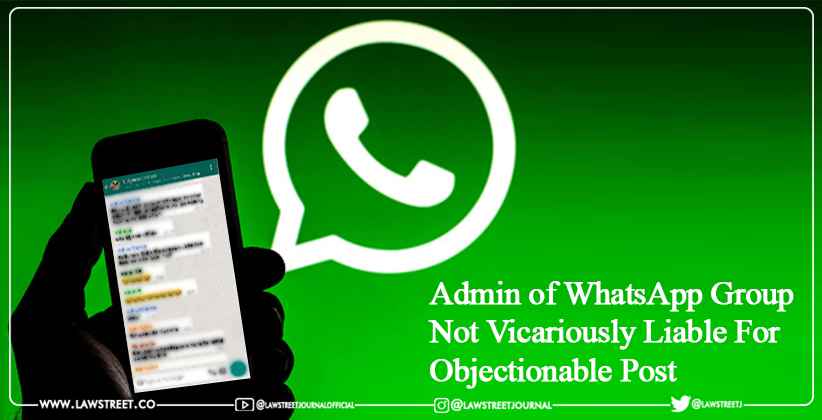The Kerala High Court on 23rd February 2022 observed in the case Manual v State of Kerala that creators or admins of a WhatsApp group cannot be vicariously held liable for any objectionable content posted by a member of the group.
Justice Kauser Edappagath noted that both the Bombay and Delhi High Courts have held that the only privilege of an admin is that he can add or delete members to a group. He doesn't actually have control over what they post and therefore, cannot be held vicariously liable for any posts put up by other members.
"As has been held by both the Bombay and Delhi High Courts, the only privilege enjoyed by the Admin of a WhatsApp group over other members is that, he can either add or delete any of the members from the group. He does not have physical or any control otherwise over what a member of a group is posting thereon. He cannot moderate or censor messages in a group. Thus, Creator or Administrator of a WhatsApp group, merely acting in that capacity, cannot be vicariously held liable for any objectionable content posted by a member of the group," the Court ruled.
In this case, the petitioner has been charged for offences under the Information Technology Act (IT Act) 2000 and Protection of Children from Sexual Offences Act 2012 (POCSO Act). None of these provisions provide for vicarious liability and therefore, holding an admin liable for posts on a WhatsApp group would go against basic principles of criminal law, the Court said.
"There is no law by which an Admin of any messaging service can be held liable for a post made by a member in the group. A WhatsApp Admin cannot be an intermediary under the IT Act. He does not receive or transmit any record or provide any service with respect to such record. There is no master-servant or a principal-agent relationship between the Admin of a WhatsApp group and its members. It goes against basic principles of criminal law to hold an Admin liable for a post published by someone else in the group. It is the basic principle of criminal jurisprudence that mens rea must be an ingredient of an offence and both the act and intent must concur to constitute a crime," the order made it clear.
The Court was considering a case where a member of a WhatsApp group had posted content depicting minors engaged in a sexual act. The petitioner was merely the creator and admin of the group. Thereafter, he was arrayed as accused no.2, the person who posted the message being accused no.1. They were charged for offences under Sections 67B (a) (b) and (d) of the Information Technology Act, 2000 (IT Act) and Sections 13, 14 and 15 of the Protection of Children from Sexual Offences Act 2012.
Advocate Anil Kumar M Sivaraman, appearing for the petitioner, sought to quash all further proceedings against the petitioner and contended that even if the entire allegations in the F1 statement or final report together with all the materials collected during the investigation are taken together at their face value, they do not constitute the offences alleged.
"Due to lack of moderation of these groups, the members therein are at almost free reign to post/share any kind of data that they wish in terms of messages, voice notes, videos, songs etc. Many members of a WhatsApp group may put objectionable contents. The legal consequences and potential liability of the Administrator, stemming from such an objectionable post has come up for consideration in this Criminal Miscellaneous Case," the Court observed
The Court stated that generally, a person can be criminally liable for the acts of another if they are a party to the offence. Nowadays, strict vicarious criminal liability is somewhat of an exception to the general rule of direct personal culpability and is a modern development through statutory provisions. Such criminal vicarious liability can be attributed only if it is provided under a particular statute, the Court said.
The Court noted from various judgments of the Supreme Court that vicarious criminal liability can be fastened only by reason of a provision of a statute and not otherwise.
"In the absence of a special penal law creating vicarious liability, an Admin of a WhatsApp group cannot be held liable for the objectionable post by a group member," the order stated.
Considering the facts of the present case, the Court opined that there is nothing on record to suggest that the petitioner has published or transmitted or caused to be published or transmitted in any electronic form the alleged obscene material or he browsed or downloaded the said material or, in any way, facilitated abusing children online so as to attract Sections 67B (a), (b) or (d) of the IT Act.
Similarly, the prosecution has no case that the petitioner used children in any form of media for his sexual gratification or used them for pornographic purpose or stored, for commercial purpose, any child pornographic material in order to attract Sections 13, 14 or 15 of the POCSO Act.
Since the basic ingredients of the offences alleged are altogether absent as against the petitioner, the Court deemed it fit to quash the proceeding against him.








